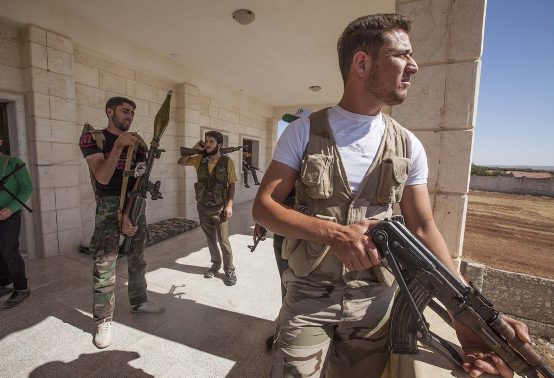Congress Sends Guns to Syria in Secret Vote

This can only end well.
Last night Reuters reported that Congress recently approved funding to send small arms and anti-tank rockets to perceived non-Islamist Syrian rebels, though it continued to withhold portable anti-aircraft rockets that could be used to shoot down civilian airliners. “The weapons deliveries have been funded by the U.S. Congress, in votes behind closed doors, through the end of government fiscal year 2014, which ends on September 30,” according to two officials.
Congress was apparently satisfied that the Obama administration and any intermediaries it was using would be able to reliably get the weapons to “moderate” rebels without strengthening the al-Qaeda-aligned rebel forces that have often proven militarily superior. Such funding had been suspended after reports of weapons filtering to more radical elements. It is unknown when this change of heart occurred, though the Reuters article notes that nonclassified defense funding passed in December.
While there is surely great diversity in Syrian rebel forces, the inclination of many prominent foreign policy voices in Congress and the media to follow John McCain’s lead in seeing a George Washington in every irregular colonel does not give one great confidence that classified Congressional appropriators are well positioned to put guns in good hands. At the very least, “moderate” may be the single least helpful adjective in foreign policy discussions. As Donald Devine wrote late last week,
Both administrations and the Journal view democracy and moderate leadership as their goals. But what does “moderate” mean? When this author was in Iraq in 2003, the moderate Shi’ite leadership was all for “democracy,” but freely admitted it was because their majority could institute their version of Sharia. …
It also wants to support “moderate opposition” in Syria and Iraq. But isn’t Maliki a moderate, who we allied with against Moqtada al-Sadr? Of course, he oppressed his Sunni moderates too, but who in the region does not oppress moderates? Do we support moderates generally in Iraq, only Sunni moderates, or only non-ruling Shi’ite moderates? In Syria, we support the Sunni moderates, but extremist rebels have defeated them at every turn, chasing the moderate military leader out of the country and turning back a recent moderate surge. The only one protecting Christian, Druze, and Turkmen minorities is the Shi’ite/Alawite dictator. There are no good choices in the Middle East.
Or, as TAC alum Michael Brendan Dougherty (who debuted his new position at The Week writing about the plight of Middle East Christians last week) put it:
“Want a gun?” “Yes!” “You’re going to kill Assad?” “Yes” “Going to kill Christian?” “Of course!..” *frowns* “..not” https://t.co/2h8jAhflcH
— Michael B Dougherty (@michaelbd) January 28, 2014
Also, while secrecy surely has a necessary place in foreign policy and military decision making, the sheer amount of uncertainty created by classified national security and military budgets necessarily undermines the possibility of democratic governance and accountability. The fact that not even the reporters breaking the story can quite nail down when the classified budget was passed makes combating waste and fraud seemingly a fool’s errand.